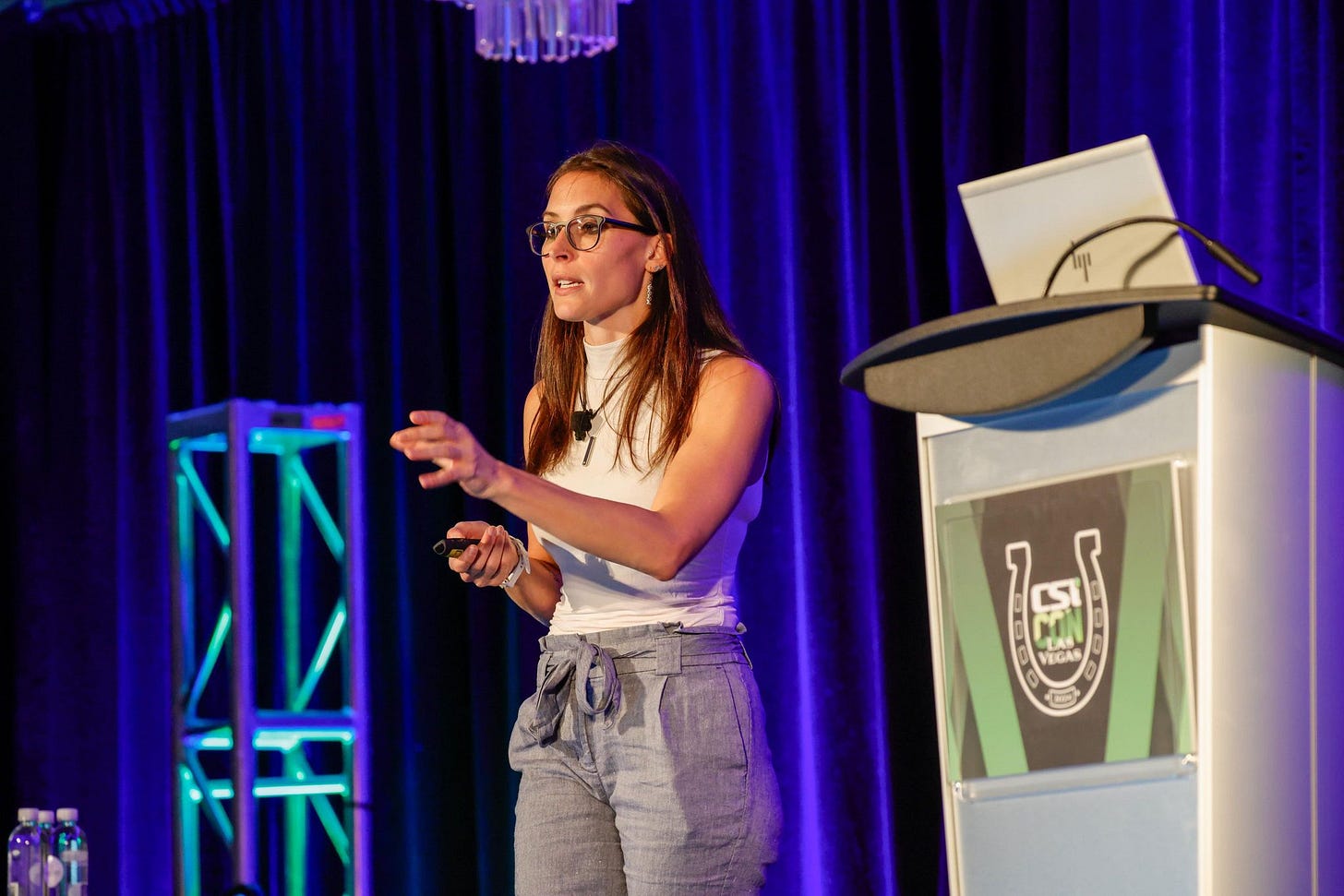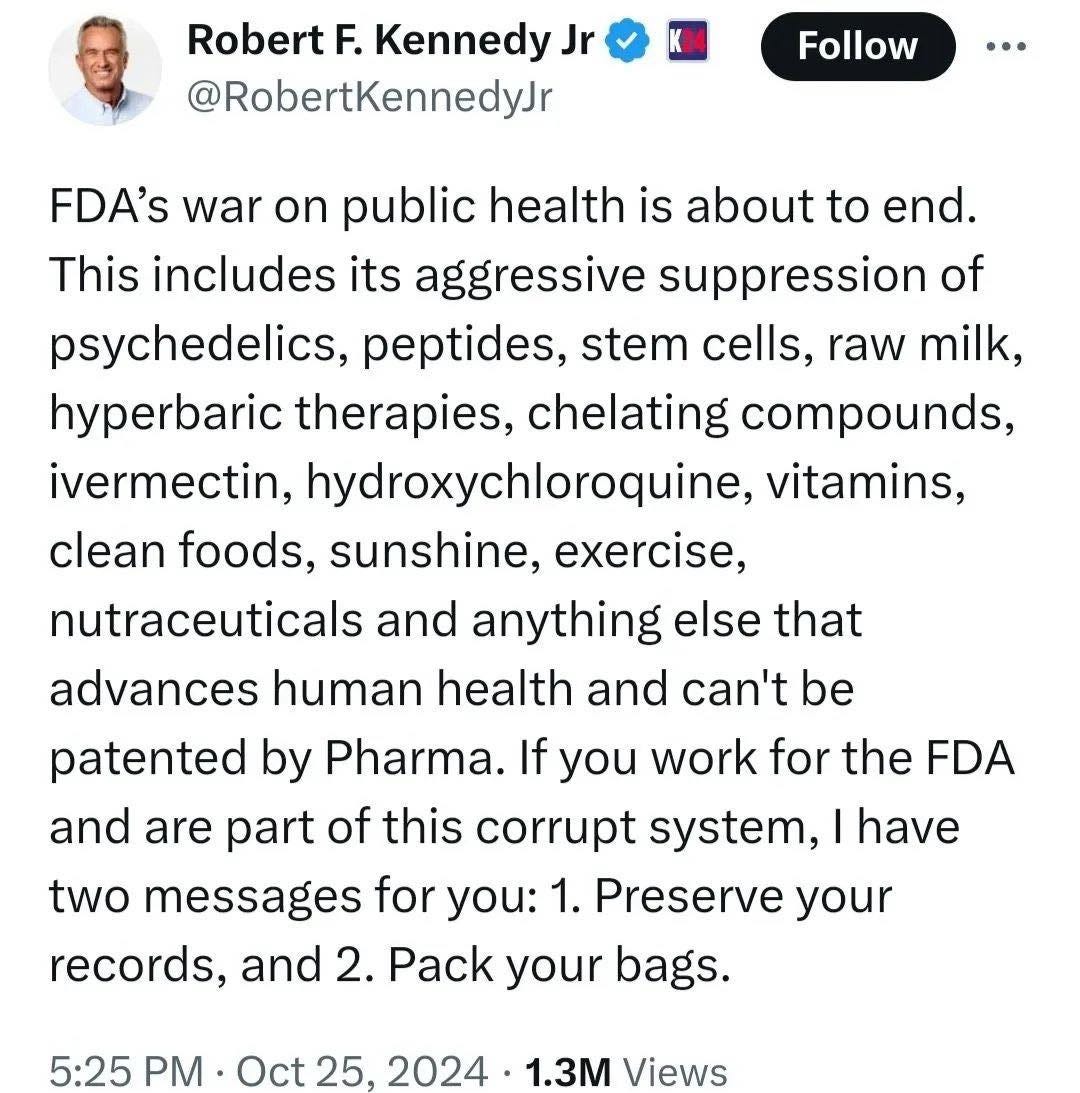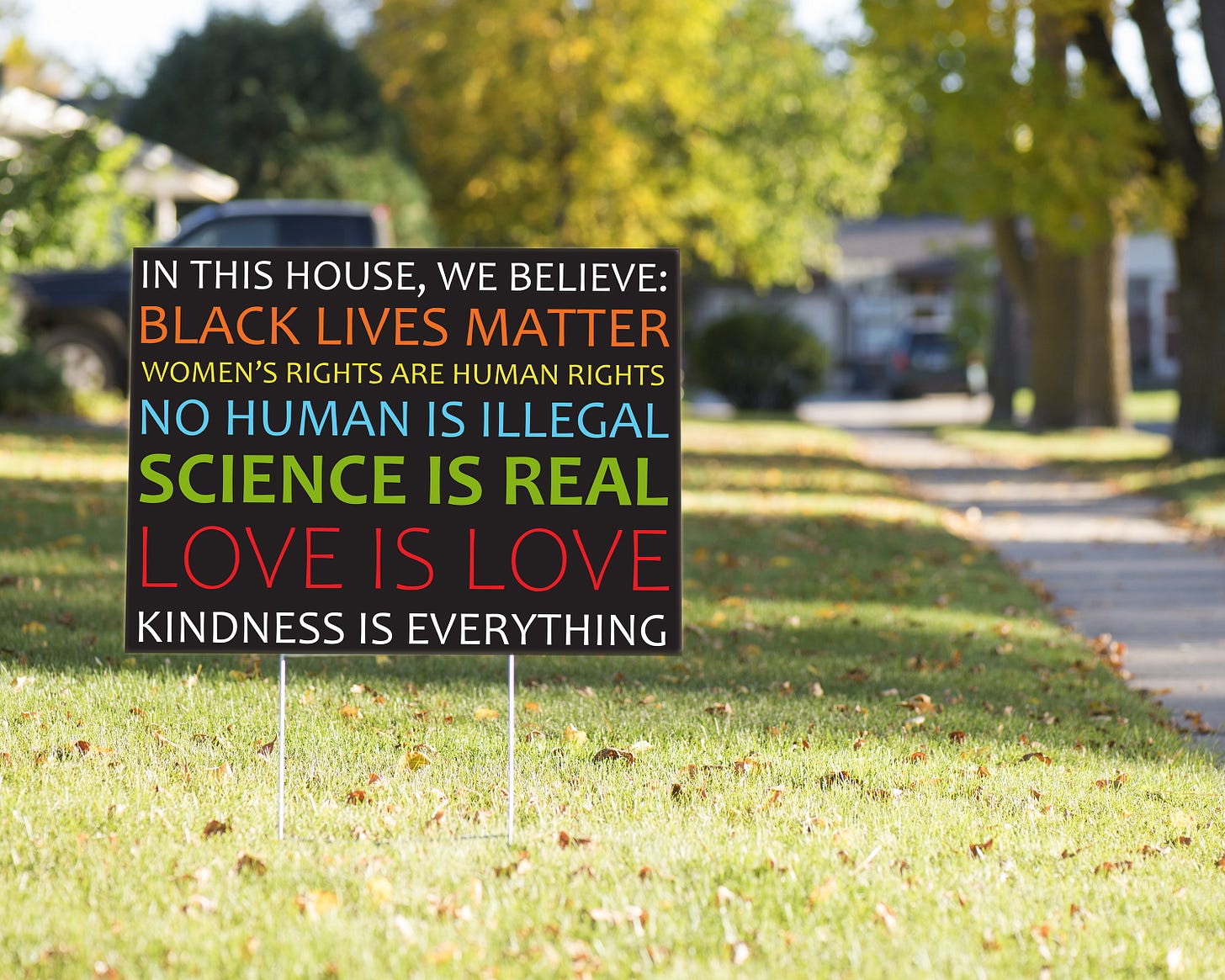Why do people selectively reject science?
Even those who "believe in science" fall prey to echo chambers shaped by feelings, biases, political ideologies, and community groups, which often override evidence.
If you haven’t been following my social channels, I just returned home from CSICon, a fantastic conference filled with presentations on critical thinking, health misinformation, biases, perception, and more.

Rina Raphael spoke about the media’s role in propagating science and health misinformation, Nick Tiller spoke about bad science and how scientific fraud contributes to wellness misinformation, Tim Caulfield spoke on the “manosphere” and the emergence of far-right conspiracism, and more.
My presentation tackled the selective rejection of science: how ideologies, belief systems, and communities cause people to refuse to accept evidence about a scientific topic even when they will on another. This has accelerated in recent years with the polarization of our society and cult-like communities shaped by social media and parasocial relationships. But let’s be clear: everyone can fall prey to science rejection. When you think you’re not at risk, that’s when you’re most vulnerable.
So let’s discuss when echo chambers supersede evidence.
Scientific evidence is in a tug-of-war where its acceptance is influenced by political, social, and ideological beliefs.
Selective rejection of science is exacerbated by the misinformation ecosystem:
Media Sensationalism: media headlines or stories amplify falsehoods using clickbait, mischaracterize data, ignore context of a study as it pertains to biological relevance, and make conclusions without evidence. This is most frequently when media outlets talk about risks of chemicals, like pesticides.
Misinterpretation of Science: Unfortunately, everyone cannot do their own research. This is true even within the scientific communities. For example, a public health scientists does not have the biological science expertise to determine whether a biological research model is appropriate or relevant to answer a question. This was illustrated in the “tampon study” which I dissected here.
Using the wrong experts: Unfortunately, media outlets, social media pages, and even other science communicators amplify and platform tangential, but not appropriate experts. For example, if you are discussing the safety of a chemical used in a skincare product, dermatologists are not the experts. Toxicologists and chemists are. As a result, irrelevant experts can be major drivers of misinformation.
Clean and Green Movement: the appeal to nature fallacy drives false notions that natural products, chemicals, medical interventions are superior, when this is objectively false. This is driven by “clean” and “green” marketing where “all natural” products are sold under the guise of being safer, better, more eco-friendly, while they frequently lack evidence to these claims.
Social Media and Influencers: We are living in a world where celebrities, number of followers, and number of sponsors are conflated with credibility. As a result, social media platforms and influencers disseminate & amplify falsehoods, often as they profit from misinformation.
This is true for everyone, even among people who legitimately believe they follow “the science” on topics.
Communities have different underlying motivations and belief systems that make them more susceptible to misinformation on different topics. These include: cultural beliefs, political ideology, religious adherence, media association and parasocial relationships, personal values, and more.
Let’s discuss some examples. Spoiler: they aren’t all far-right individuals.
Educated progressive liberals frequently believe GMOs, pesticides, and “chemicals” are harmful, but accept other biotechnology and medical interventions like vaccines.
Are you someone who might have this yard sign up and are a vocal advocate for preventive health measures like vaccines, but at the same time believe conventional produce is unhealthy and filled with toxic pesticides? Do you buy organic foods because you think they’re healthier or pesticide-free? Do you opt to purchase products with the “non-GMO” label slapped on them?
I hate to break it to you - but those beliefs are not based in evidence. And far left eco-conscious individuals were actually the original anti-GMO contingency. The motivation behind these beliefs among these individuals is usually a concern for the environment, their individual health, and their family’s health. As a result of clever marketing and the appeal to nature fallacy, they have been convinced that agriculture science is a detriment.
The reality is, anti-science activist groups like the Environmental Working Group, Consumer Reports, and Greenpeace have spent decades undermining the benefits of genetic engineering in the context of agriculture.
Read more about genetic engineering principles below:
GMOs and genetic engineering are wildly misunderstood
Few topics in science, health and food elicit more fear and misconceptions than the phrase GMO, and most of it is based on intentional disinformation.
Organic agriculture and products are sold using clever marketing campaigns to individuals who are rightfully concerned about their health and the environment, but the data demonstrate that organic farming is not better for your health - or the planet.
In fact, many organic pesticides are more ecologically damaging, require greater application levels, and can have worse off-target effects. Additionally, organic farming yields less per unit area and contributes more to indirect greenhouse gas emissions. And organic farming prohibits GE crops - GE crops which have actually reduced pesticide use in the last several decades.
If you actually want the most environmentally-friendly farming, you should be in support of modern agriculture tools like genetic engineering.
Unfortunately, the general public refuses to listen to scientific evidence on the topic of GE crops and foods produced from those plants.
Those who think GE crops are harmful tend more often to be women than men, as marketing geared toward undermining the safety and benefit of GE crops frequently targets women, often mothers, and exploits health anxiety.

And those who think GE crops are harmful also have the lowest objective knowledge about the science behind these food crops. As opposition to GMOs increases, objective knowledge of science and genetics decreases, but self-assessed knowledge increased. Some people would call this the Dunning-Kruger effect.
Ironically, the same technologies that are used for GE crops and agriculture are being used for medical interventions today: treatments for cancers like CAR T cell therapies. As such, it is critical that we address serious gaps in science literacy on these topics.
Progressive liberals say science is real. But do they act that way?
For example, California and California Governor Gavin Newsom frequently extol the legitimate benefits of vaccines for communicable diseases. In fact, California revoked personal exemptions from vaccine requirements from public schools in 2016 after a significant measles outbreak originating at Disneyland.
However, while these individuals trust the FDA when it comes to their assessment of safety and benefit of vaccines and approved medical interventions, they reject their safety assessment and conclusions on the safety of food ingredients.
In the past year and a half, Gavin Newsom has signed 2 laws banning 7 food colorings based on misinformation. The sponsors of these bills? None other than the anti-science activist Environmental Working Group and Consumer Reports. Media outlets go so far as to falsely claim these colorings are banned in other countries (they’re not) and that they are “carcinogenic” (they’re not, definitely not at levels we would be exposed to).
Unfortunately, even this cohort of people are shaped by their belief systems: they’ve been targeted to believe these substances are toxic simply because they are synthetic, exploiting the appeal to nature fallacy and preying on health anxiety. These uninformed ingredient bans will do nothing other than to undermine our food safety agencies and erode trust in science - and they certainly won’t improve health outcomes.
Far-right conspiracy theorists claim our food is “poison,” but not for the same reasons.
While the wellness industry and the clean and green movements really started with liberal-leaning individuals concerned with the environment, the wellness industry has veered firmly into the arms of medical conspiracists.
There is a direct link between medical conspiracism and wellness behaviors: buying and taking unregulated dietary supplements, herbal products, vitamins/minerals, purchasing organic food. The more medical conspiracies a person believes, the more wellness behaviors they participate in. On the flip side, they also participate in fewer evidence-based health measures such as wearing sunscreen, going to the dentist, getting preventive healthcare, and getting vaccines.
The number one conspiracy that respondents believed is that the government is hiding “natural cures for cancer.”
Perhaps it needs to be more widely known that supplement companies selling “natural cures” are also drug companies, they just don’t have to answer to safety regulators? And the dietary supplement industry is valued at $177.5 billion dollars?
These individuals tend to be less educated, lean conservative (sometimes far-right), and tend to congregate in person and online among anti-government and anti-mainstream echo chambers.
Tech-savvy libertarians reject FDA-approved biomedical advances yet enthusiastically support unregulated wellness products and other scientific technologies.
Think Bill Maher, Max Lugavere, Peter Thiel, Elon Musk, Dave Asprey, Andrew Huberman, and Joe Rogan types. The motivation among these individuals is frequently to erode confidence in regulatory oversight under the guise of the “American dream” of rugged individualism.
Today, this cohort tends to be younger men (millenials and gen Z) who predominantly consume information via social media and podcasts, where the majority of health content is false.
These individuals usually follow your Silicon Valley tech bros and are frequently at the leading edge of adopting new technology when it comes to digital electronics and apps. Many older members of this group, particularly the influencers tend to be affluent as a result of podcast and book deals where they promote unproven wellness products that claim to improve your health. This cohort makes up a large swath of the “Manosphere,” the contingency of men that think public health isn’t masculine, so they’d rather eschew pasteurization, food hygiene, sunscreen, and preventive health measures.
It is also aligned with the current Make America Healthy Again movement spearheaded by RFK Jr. and his acolytes, where he claims the FDA is waging a war on health and he’ll make sure they open the floodgates to the Wild West of snake oil.

Their motivation hinges on the false claim that the government is corrupt and wants to control you by implementing common-sense policies that aim to keep society and the planet healthy. As such, they demonize scientists and evidence that aligns with the positions of public health and regulatory agencies like CDC, FDA, USDA - and even international agencies like the European Food Safety Authority (EFSA), the Joint FAO/WHO Expert Committee on Food Additives (JECFA), and more.
If a scientist says something that agrees with a safety agency, they are immediately a “corrupt shill” - but at the same time, these individuals will enthusiastically endorse all of the unregulated wellness products: dietary supplements, fad diet protocols, “biohacking” health tests that aren’t FDA-approved, raw milk, compounded medications (yes, like medications that ARE approved, but they lack quality oversight), and more.
They want us to return to the good ol’ days of the early 1900s where unpasteurized milk products accounted for 25% of all food-borne illnesses. Where medications didn’t have safety agencies like the FDA to regulate them, and liquid antibiotics were prepared with untested solvents like diethylene glycol (a component in antifreeze) which killed people.
Spoiler: that’s where the current wellness industry is, thanks to the 1994 Dietary Supplement Health and Education Act. You can thank your politicians for that one.
The less regulation the better - because how dare you try to implement guardrails to keep society safe! No matter that these very individuals profit directly from the deregulation of these governmental agencies while selling unregulated products and actively harming people.
Left-leaning “toxin-free” folks were the OG anti-vaxxers. Today, vaccines are politicized by the far-right.
Vaccines: one of the greatest medical and scientific developments in human history. Also one of the most vilified, thanks to how successful they are. Ironically, they are rejected across political ideologies, although in recent years, we have seen a shift where more conservative and libertarians refuse to concede the importance of vaccines.
Progressives and left-leaning individuals tend to reject vaccines based on false claims related to harmful chemicals (like thimerosal) or false claims related to adverse effects of vaccines, like the fabricated link between vaccines and autism (read here).
Conversely, conservative skepticism centers around the refusal to allow someone else (here, that someone is the government) tell them “what to do,” even if it relates to a public health measure that has impacts beyond an individual, since you know, we live in a society, with other people.
Whatever the belief, anti-vaccine rhetoric and vaccine refusal is a top 10 global health threat. As a result of disinformation amplified through social media, science, safety agencies, and public health are under threat.
False claims spread like a virus. In order to stop the spread, we must cut off the lies at one of the nodes. All of us have a role to play in combating harmful myths that target facts and reality.
Thank you for supporting evidence-based science communication. With outbreaks of preventable diseases, refusal of evidence-based medical interventions, propagation of pseudoscience by prominent public “personalities”, it’s needed now more than ever.
Stay skeptical,
Andrea
“ImmunoLogic” is written by Dr. Andrea Love, PhD - immunologist and microbiologist. She works full-time in life sciences biotech and has had a lifelong passion for closing the science literacy gap and combating pseudoscience and health misinformation as far back as her childhood. This newsletter and her science communication on her social media pages are born from that passion. Follow on Instagram, Threads, Twitter, and Facebook, or support the newsletter by subscribing below:
54











As a healthcare provider, I have a hard time keeping up with the mis- and disinformation out there and what our patients are seeing and hearing about health and "wellness." It's challenging enough to keep up with evidence based guidelines... never thought we'd have to be debunking so much mis- and disinformation as well. I feel ill-equipped for that sometimes! Your content is helpful, Andrea. Thank you!
Well done. Thank you.